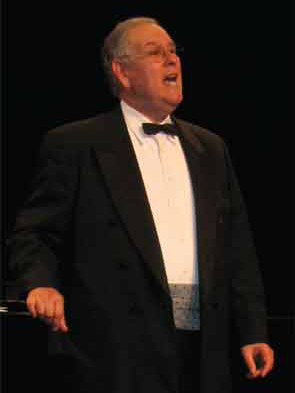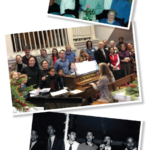After the Navy, Dr. Appelrouth moved to Atlanta, where he opened his solo rheumatology practice. He had a piano in his office and invited his patients to attend his performances, which were held in a hospital auditorium.
He found yet another voice teacher and attended the Georgia State University Opera Workshops, which focused on acting, fencing, and singing. His concerts now featured classical English tunes, Italian arias, and German Lieder, which are 19th century romantic German poems set to music. Although he loved singing the latter, his audiences didn’t share his enthusiasm. He responded to his fans and began incorporating popular Broadway show tunes and Yiddish songs into his performances.
Dr. Appelrouth’s local reputation kept growing. In 1996, he sang the Star Spangled Banner at the old Fulton County Stadium at the start of an Atlanta Braves baseball game. Thousands of people watched his performance, hearing him hit those difficult high notes.
Recognizing his talent, two Atlanta synagogues also chose Dr. Appelrouth to serve as their High Holiday cantor. He practiced songs for Yom Kippur and Rosh Hashanah for three months prior to these holidays. However, he bowed out as cantor when each synagogue grew to 500 members and needed a full-time cantor.
Once I was in med school, I needed to continue singing, as it was good for my soul.
—Daniel Appelrouth, MD
Illness Strikes
Dr. Appelrouth’s singing continued to take a back seat to his medical career until he experienced serious health problems. He had a heart attack in 1998 and a second in 2001, then retired from his rheumatology practice. This was really the first time since his medical career began that he could dedicate more time toward his music. He continued giving concerts and added a surprise in two performances that delighted audiences—a duet with his son, Jed. “People still talk about the concerts with the duets,” he says, adding that these were among his most memorable performances.
Crossing Boundaries
Despite his innate talents, Dr. Appelrouth never once thought of becoming a professional singer. However, in 2005, he was encouraged by his voice teacher to make a CD.
“She said, “It’s time to record,” so we went back over the last 10 years of concerts and chose 13 Broadway hit tunes and five Yiddish songs,” he recalls.
That same year, he set up the Atlanta Hunger Relief Fund. Dr. Appelrouth’s ultimate dream is to raise $1 million, in part by performing at the Fox Theater in Atlanta, which seats 4,000. But that dream hasn’t been realized—yet. Since Dr. Appelrouth is Jewish and observes the Sabbath, he can’t perform on Friday evenings or Saturdays before sundown. “I couldn’t perform in any stage play,” he says. “It really limited what I could do.”

